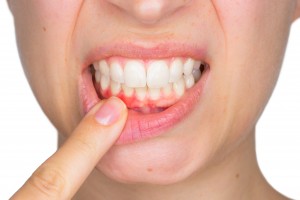6 Causes of Sensitive Gums
When you think about oral health, your teeth probably come to mind first. But your gums are equally important. After all, they protect your teeth and help ensure a healthy smile.
If you have swollen, sensitive gums, this could be a sign of gingivitis, which could lead to periodontal disease and tooth loss if left untreated. However, this is certainly not the only reason for gum sensitivity. Learn about the other causes of sore gums – you might be surprised to discover some habits you should change.
Brushing Too Hard
When you brush your teeth, your goal is to remove food particles and gummy plaque before these substances cause tooth decay. You might assume this means you should brush as hard as possible, the way you would when scrubbing dishes.
However, if you’re too rough, you could irritate your gums and even damage tooth enamel. Unless your dentist suggests otherwise, always use a toothbrush with soft bristles. Then, focus on massaging your gums with gentle back-and-forth motions at the gum line rather than brushing harshly.
If you notice dark stains on your teeth, this means bacteria has already calcified into tartar. You can’t remove tartar with vigorous brushing – you need a professional dental cleaning from Dr. Evanson to restore your pearly whites.
Irritation from Acidic Food
Certain foods, especially those with high acid content, can leave your gums feeling sensitive. Visible redness, canker sores, and even receding gums can occur if you eat too much citrus fruit, soda, and sugary yogurt. Try eliminating these and other acidic foods from your diet for a few days and see if your gum sensitivity goes away.
Irritation from Oral Appliances
Braces, retainers, dentures, and even mouth guards can poke or tug at your gum line, leaving this tender tissue feeling swollen and sore. Sometimes, the soreness goes away once your mouth grows accustomed to the new appliance. If the pain continues, ask Dr. Evanson about using a wax product or having the oral appliance adjusted.
Using Tobacco Products
Cigarettes and chewing tobacco can cause gum problems. When you smoke or chew, cytotoxins enter your mouth, which are unkind to your gums. These chemicals destroy cells and tissues in your body, which can lead to canker sores, bleeding gums, and cracked lips.
The nicotine found in tobacco also causes the blood vessels in your gums to restrict, resulting in a deficient blood supply that can make your gums recede. Tobacco use also drastically increases your chance of developing oral cancer.
Stress
This may seem like a stretch, but your stress level plays a prominent role in your dental health. After all, if you’re stressed, you’re more likely to grind your teeth, which can lead to painful, receding gums. The Academy of General Dentistry also identifies an intrinsic relationship between stress level and gum health. Because stress decreases the effectiveness of the immune system, highly emotional people are more prone to infections, including gum disease.
Hormonal Changes
Some causes of sensitive gums are out of your control, including the hormonal changes that occur during pregnancy. The American Dental Association states that hormone fluctuations change the way your body interacts with bacteria in your mouth. This may increase your chance of gum disease and tooth decay, so be sure to see Dr. Evanson regularly during your pregnancy, even if you don’t experience sensitive gums.
Schedule a Dental Checkup at Evanson DDS
By avoiding these causes of sensitive gums and improving your dental hygiene, you may discover that the pain and redness subsides. However, if gingivitis is the underlying cause, you need professional dental care to stop this condition from progressing.
Contact Evanson DDS online or call our office at (720) 409-0008 to set up your next dental checkup and cleaning. We’ll assess your gum health and suggest lifestyle changes that could help decrease gum sensitivity.
Leave a reply →






